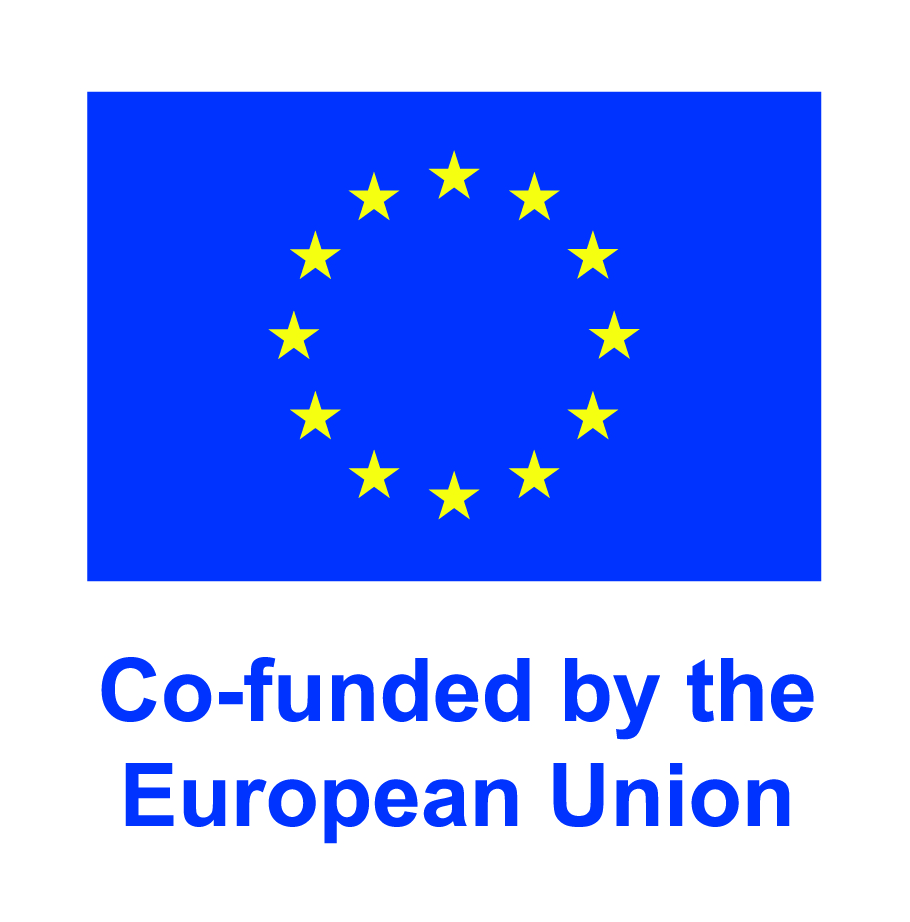
Faculty of Biosciences and Aquaculture at the Nord University is the lead partner in the project. As the lead partner, it will be involved in all work packages and conduct some of the crucial activities in the project. It will also lead the WP4. The spotted wolffish will be kept at the FBA facilities and all the research related with wolffish will be either conducted at FBA or in direct collaboration. FBA will also collaborate in activities related to nelma with Russian partners and Arctic char with Swedish and Russian partners. FBA will organize a workshop open to the industry in 2022 focused in the spotted wolffish, European whitefish and Arctic char production in Northern Norway. FBA has several specialists in the aquaculture field that cover reproduction, nutrition and health.
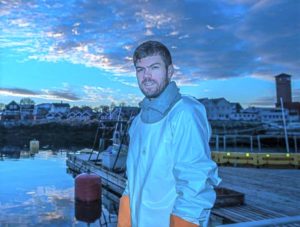
Ørjan Hagen (orjan.hagen@nord.no) is one of these specialists and he is the project leader. Ørjan holds a PhD from the School of biology at the University of St Andrews (Scotland) and has since mid-2000 mostly been working with applied science projects. Through the years Ørjan has been working with several fish species and gained a broad knowledge from projects dealing with different aspects of aquaculture production and on-growth of fish, fish quality, fish nutrition and sterile fish technology.
In the past years, FBA has been closely working with companies to help to solve some of the bottlenecks of the spotted wolffish aquaculture. This research has been focused on the two key areas of this project: Reproduction (see the project BESTBROOD) and Nutrition. Currently, 5 professors, 1 researcher and 1 PhD students from FBA are directly involved in research activities for the development of the spotted wolffish. FBA is also the leader in the recent formed WOLFNET (research network for wolffish) that involves several nordic countries including Canada.
Akvatik AS is a private company (SME), established in 2013, and located in Bodø, Norway. The main focus areas are aquaculture, biotechnology and bio-innovation, including culture and utilization of marine organisms. Contact person, Oddvar Ottesen: akvatik3@gmail.com

Sigerfjord Fisk AS is located in Sigerfjord in Sortland municipality, the northernmost municipality of Nordland county. The company was established in 1989 by Trond Geir Reinsnes with the purpose of slaughter Arctic char and salmon including processing and sale. Today Sigerfjord AS produces 70 % of the char sold on the Norwegian market. Prior to the establishment of Sigerfjord Fisk AS, Trond Geir had been working with Arctic char for several years through the establishment of Blokken and Sigerfjord Stamfiskstasjon.
Sigerfjord Fisk AS is the only Arctic char company in Norway with part of their production cycle in the sea. This way of producing the fish gives it a very nice and distinct silvery appearance and the fish can easily be mistaken for being a wild sea migrating Arctic char. This special appearance is characteristic for the branding of “Ishavsrøye Vesterålen” and the nickname “queen of salmon”. In addition to freshly harvested fish, Sigerfjord Fisk also produces several other products such as fresh fillets, cold and warm smoked fillets of char. Several of their products have been recognised and awarded.
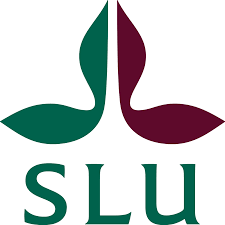
The Department of Animal Breeding and Genetics at SLU is based at Ultuna Campus, Uppsala, and has about 60 co-workers. Our vision is “Better use of genetic resources”. We perform research in molecular, quantitative and applied genetics, and bioinformatics, across a range of livestock species and companion animals. The department is responsible for managing the national Swedish breeding programs of Arctic charr and rainbow trout. Furthermore, we also contribute to several education programs at SLU, and provide international genetic evaluation services for cattle through the Interbull Centre. Contact person, Christos Paloikostas: christos.palaiokostas@slu.se
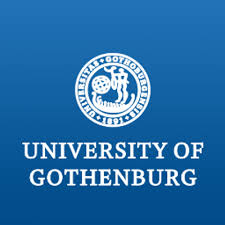
The Swedish mariculture research center (SWEMARC) at the University of Gothenburg is one of six of the University’s strong research center based on important and current social issues. The main goal of SWEMARC is to increase marine aquaculture in an environmentally friendly way through interdisciplinary and community engaging research. SWEMARC is a research environment with around 50 members, encompassing a broad competence in aquaculture research that spans social, political, and natural sciences, and art and design. We are committed to increasing the critical mass within the aquaculture research area as well as to strengthen the concrete cooperation with industry and entrepreneurs in other regions and countries for a broadened partnership and real problem-oriented research.
Within the ARCTAQUA-project, SWEMARC will contribute mostly with research and development within WP2 (nutrition) on the spotted wolffish biology, and in the WP4 industry workshops. We have several years of research experience on the farming biology of wolffish, with special focus on nutrition, health and welfare physiology. Particular attention has been paid to finding sustainable, marine sources for feed ingredients.
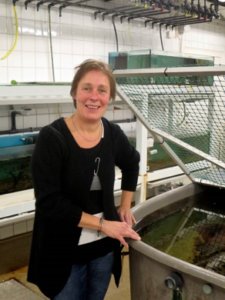
PIs in the ARCTAQUA-projects are Dr Elisabeth Jönsson Bergman (focus 2.1 activity) (elisabeth.jonsson@bioenv.gu.se) and Prof Kristina Snuttan Sundell in the picture (focus 2.2 activity). Sundell is the director of SWEMARC and heads a research group of ca 10 people, with long-standing expertise in fish physiology, and more lately, recirculating fish farming systems, and with an excellent capacity for conducting experiments in different aquaculture systems. We have state-of-the-art competences in development of new marine ingredients for feed, in combination with fundamental knowledge and experience in fish biology, health and welfare and assessment of fish performance, appetite, behaviour nutrient uptake through physiological/biochemical analyses and growth indicators, including hormones. SWEMARC will recruit one post-doc devoted to the ARCTAQUA-project (WP 2). In addition, we have several group members, including PhD-students and a lab technician, who will contribute with their knowledge in wolffish physiology and analytical skills.

Luke is a non-profit public research organisation operating under the Finnish Ministry of Agriculture and Forestry. It employs c. 1500 people and is the leading Finnish research institute in the bioeconomy sector, providing scientific information and new innovations for the industry. Luke provides new solutions towards the sustainable development of the bioeconomy and the promotion of new biobased businesses. Together with our partners Luke will build a society based on bioeconomy. Luke has decades-long and well-respected expertise in the area of fish genetics, aquaculture, and broodstock management.
Contact person, Antti Kause: antti.kause@luke.fi

Murmansk State Technical University, located in the port city of Murmansk, is a renowned educational and research institution in the Russian part of the Barents region. Within its 70-year history, MSTU has been providing highly skilled workforce for companies working in the High North in such fields as marine engineering and navigation, oil and gas production, environmental protection, marine biology and food processing. MSTU’s department of biology and aquatic bioresources has developed a complex three-tier curriculum in the field of marine biology for bachelor, master and PhD students. The curriculum, aimed at developing both theoretical and practical skills, is focused on sustainable use of bioresources and aquaculture development in the Arctic. Its area of research covers Arctic flora and fauna, specific features of Arctic living organisms, spatial-structural organization of phytocenosis, zoocenosis, ichtyocoenosis of marine and freshwater basins of the Kola peninsula.
Mr. Petr Kravets, PhD in biology, Docent of MSTU biology department, is in charge of MSTU activities in ARCTAQUA project. MSTU is the leader and a major contributor to WP3 “Fish Health and Welfare”. MSTU is also a contributor to a number of activities within the WP1 Reproduction and selective breeding. MSTU researchers and students are going to participate in other WPs activities. MSTU will also organize an industry workshop in 2021 to raise awareness about the recent developments in the Arctic aquaculture and to promote research-intensive aquaculture in the region by introducing the best practices to businesses and supporting their successful implementation.
Contact person, Natalia Anikeeva (Head of International Cooperation Department): anikeevanm@mstu.edu.ru
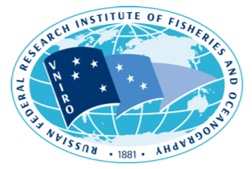
GosNIORH named after L.S. Berg is located in Saint Petersburg. It has been a branch of the Russian Federal “Research Institute of Fisheries and Oceanography” “VNIRO” (Moscow) since 2019. The main goals of Berg are a comprehensive scientific study of aquatic biological resources of freshwater and marine (Finland Gulf) reservoirs in the North-West of Russia. One of the institute’s leading areas is aquaculture of whitefishes: breeding technologies, nutrition, and biology features (morphology, reproduction, physiology, biochemistry, genetics).
Berg is responsible of WP 2-Nutrition in the ARCTAQUA. Berg’s main work in the project includes 1) developing feed diets for nelma spawners and testing its at the fish farm “Forvat”; 2) sharing experience on technologies for growing nelma and whitefish; 3) handbook that includes an overview of Russian whitefishes promising for aquaculture, their breeding and health during commercial cultivation and; 4) histological atlas of embryonic and postembryonic development of nelma and whitefish.
Contact person, Vera Bogdanova: vera-bogdanova@yandex.ru
